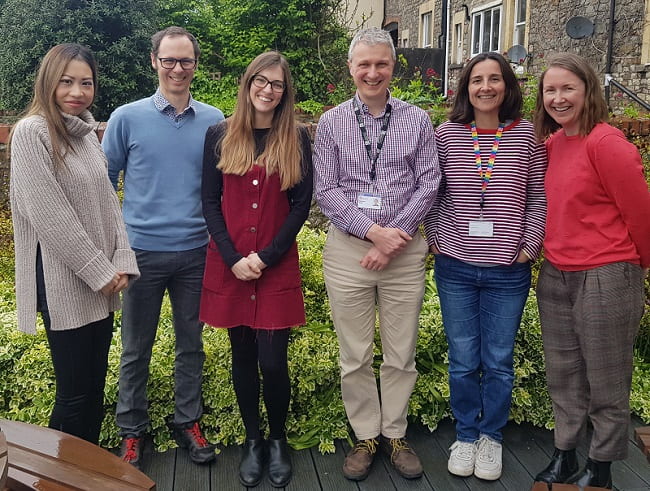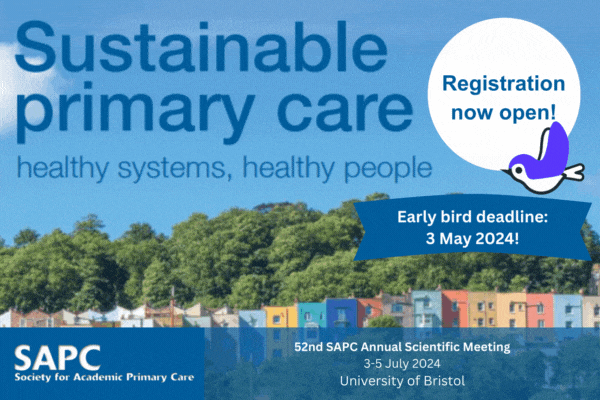A major clinical trial investigating whether GP use of rapid diagnostic tests for respiratory (chest) infections can reduce same-day antibiotic prescribing in primary care has completed recruitment early.

The RAPID-TEST trial, led by Professor Alastair Hay at the Centre for Academic Primary Care, University of Bristol, originally aimed to complete recruitment of 514 patients by September 2024. With enormous interest in the trial from GP practices across the Bristol, Bath, Swindon, North/North East Somerset, South Gloucestershire, Gloucestershire and Wiltshire areas, the target was met five months early.
Every year, millions of people in the UK seek help for respiratory infections, such as coughs, colds, chest infections, sore throats and earaches. On average, GPs and nurses give antibiotics to half of these patients. This is more than is necessary because most respiratory infections are caused by viruses, including COVID-19, and antibiotics only work on bacteria. This is needlessly contributing to antimicrobial resistance (AMR), but since clinicians don’t always know who needs them, they are often given ‘just in case’.
The trial was launched in November 2022, thanks to an award of £1.6 million from the National Institute for Health and Care Excellence (NIHR). The tests (only available within the trial) are carried out in GP surgeries rather than sent to a laboratory and detect the presence of viruses and some bacteria, with results available on the same day.
Professor Hay, a GP and Professor of Primary Care, believes that recruitment has been successful due to a combination of factors, including:
- participation of research-interested and research-experienced GP practices
- a research question seen as relevant and important to clinicians and patients
- thorough preparation (a feasibility study) giving us confidence the trial would work
- an intervention popular with practice staff and patients (a rapid microbiological point-of-care test that detects the most common viruses causing respiratory infections from a nose/throat swab in 45 minutes)
- an excellent research team, consisting of patient and public members, and Bristol Trials Centre, Centre for Academic Primary Care, and North Bristol NHS Trust staff.
Professor Hay said: “I am delighted the trial has recruited so well and I am particularly grateful to the study team, GP practice staff and patients, without whom studies of this kind would not be possible. There is still much to be done, including an important patient and clinician survey, and we expect to have results available early in 2025.”
Dr Alison Humphrey, GP Partner at one of the GP practices taking part in the study, said: “The staff at Hope House Surgery have appreciated being part of this important and well-run study, delivering rapid test results within the surgery which enables us to provide the best possible patient care and antibiotic stewardship. We are very grateful to all our patients for being so willing to participate. We are looking forward to hearing the results and seeing how this will improve or change patient care in the future.”
Professor Rebecca Kearney, Director of Bristol Trials Centre, said: “Bristol Trials Centre is very pleased that the results from this important research question will be implemented ahead of schedule due to the successful collaboration of teams and partner organisations involved.”
For a full list of all the participating GP practices, see the RAPID-TEST website.
Further information
See also:
Editorial in British Journal of General Practice (BJGP), 2020: Point-of-care testing for respiratory infections during and after COVID-19 by Hannah Thornton, Tanzeela Khalid and Alastair Hay.
Listen to the BJGP podcast – a more in-depth discussion about the issues raised in the BJGP editorial with Professor Alastair Hay.
Novel multi-virus rapid respiratory microbiological point-of-care testing in primary care: a mixed-methods feasibility evaluation. Tanzeela Khalid, Lorna Duncan, Hannah Thornton, Gemma Lasseter, Peter Muir, Zara Abigail Toney, Alastair Hay. Published in Family Practice. March 2021.
About the Centre for Academic Primary Care
The Centre for Academic Primary Care (CAPC) at the University of Bristol is a leading centre for primary care research in the UK, one of nine forming the NIHR School for Primary Care Research. It sits within Bristol Medical School, an internationally recognised centre of excellence for population health research and teaching. Follow on X: @capcbristol and LinkedIn
About Bristol Trials Centre
Bristol Trials Centre (BTC) is a UKCRC-registered Clinical Trial Unit. We offer a wide range of expertise in trials methodology, study design, study management, statistical analyses and data management, including bespoke database design. It sits within Bristol Medical School, an internationally recognised centre of excellence for population health research and teaching. Follow on X: @BrsTrialsCentre
About the NIHR
The mission of the National Institute for Health and Care Research (NIHR) is to improve the health and wealth of the nation through research. We do this by:
- Funding high quality, timely research that benefits the NHS, public health and social care;
- Investing in world-class expertise, facilities and a skilled delivery workforce to translate discoveries into improved treatments and services;
- Partnering with patients, service users, carers and communities, improving the relevance, quality and impact of our research;
- Attracting, training and supporting the best researchers to tackle complex health and social care challenges;
- Collaborating with other public funders, charities and industry to help shape a cohesive and globally competitive research system;
- Funding applied global health research and training to meet the needs of the poorest people in low and middle income countries.
NIHR is funded by the Department of Health and Social Care. Its work in low and middle income countries is principally funded through UK Aid from the UK government.










